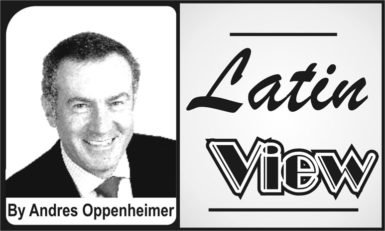Cuban military dictator Raúl Castro’s transfer of one of his many titles — actually, the least important one — to Miguel Díaz-Canel has been described by many foreign leaders and international media as a “transfer of power,” a “transition” and the start of “a new era” on the island. That’s laughable!
Castro, 86, will retain his two most important jobs: head of the Communist Party — which, according to the Cuban regime’s constitution, is “the superior guiding force of society and the state” — and supreme commander of the armed forces.
Díaz-Canel, who turns 58 on Friday, was appointed president, the third most powerful position in Cuba. It’s largely a ceremonial job: He will have close to zero chance to change anything until Castro dies or retires from his almighty job as head of the Communist Party three years from now.
 Díaz-Canel himself said in his inauguration speech on Thursday that his job will be to preserve Cuba’s nearly six-decades-old totalitarian regime, which in line with the official jargon he referred to as “the revolution.” Díaz-Canel said, “The mandate given by the people to this legislature is the continuity of the revolution.”
Díaz-Canel himself said in his inauguration speech on Thursday that his job will be to preserve Cuba’s nearly six-decades-old totalitarian regime, which in line with the official jargon he referred to as “the revolution.” Díaz-Canel said, “The mandate given by the people to this legislature is the continuity of the revolution.”
Mandate given by the people? How ridiculous! The Cuban people have not had a single free election in nearly sixty years. All opposition parties and independent newspapers or electronic media are strictly forbidden. People who disagree with the military regime’s official credo are branded as enemies of the people, and persecuted.
And Cuba’s National Assembly of the People’s power, the legislature referred to by Díaz-Canel, is a joke: There is not one single opposition legislator, and only one candidate — Díaz-Canel — was on the ballot to run for president. A total of 603 of the 604 legislators voted for Díaz-Canel, according to Cuba’s official media.
Amazingly, even some Latin American governments that have taken a strong stand for the restoration of democracy in Venezuela have congratulated Cuba for Díaz-Canel’s appointment.
Mexican President Enrique Peña Nieto wrote on his Twitter account that, “Mexico congratulates Miguel Díaz-Canel for his election as president.” In a separate tweet, Peña Nieto added that “With the general elections, a new page is being written in the history of Cuba. Our best wishes to Cuba’s National Assembly and president Miguel Díaz-Canel in his new job.”
What’s there to congratulate Díaz-Canel for? The fact that he has supported throughout his entire political life one of the world’s most repressive dictatorships? The fact that in his inaugural speech he vowed to preserve a regime that last year alone jailed or detained for political reasons a record 9,940 people, according to the Cuban Commission of Human Rights and National Reconciliation?
Granted, you can argue that Díaz-Canel’s appointment is “historic” because he will be the first Cuban president in recent history whose last name won’t be Castro, and because he represents a younger generation that may be more open to change than his predecessors.
According to this line of thought, the fact that Díaz-Canel didn’t give any hint in his inaugural speech that he may become a reformer doesn’t mean much, because that would amount to his political death in Castro’s Cuba. Former Soviet Union leader Mikhail Gorbachev was an obedient ruling party apparatchik until the day he became Communist Party leader, and began to open up Russia’s political and economic systems, the argument goes.
Maybe so. Nobody can rule out that Díaz-Canel may become Cuba’s Gorbachev one day. But most likely, at least during the next three years, while Castro continues to be Cuba’s maximum leader as head of the Communist Party, Díaz-Canel will continue to be an opaque yes-man for an aging dictator.
At the most, Díaz-Canel will be a “babysaur” who will replace a dinosaur in one of his many jobs. Instead of congratulating him for his ridiculous “election,” foreign leaders should send Díaz-Canel a strong signal that in the 21st century there is no place for dictatorships that don’t allow opposition parties or freedom of expression. And we in the media should call the Cuban regime for what it is under any dictionary’s definition: a dictatorship.






